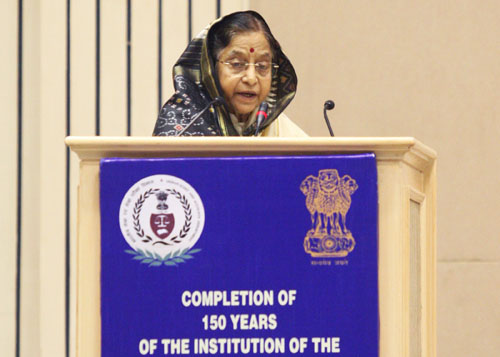
SPEECH BY HER EXCELLENCY THE PRESIDENT OF INDIA SHRIMATI PRATIBHA DEVISINGH PATIL ON 150th ANNIVERSARY CELEBRATIONS AND TO RELEASE A STAMP OF THE INSTITUTION OF THE COMPTROLLER AND AUDITOR GENERAL OF INDIA
New Delhi, 16th November, 2010

Ladies and Gentlemen,
I am very happy to be here to inaugurate the 150th Anniversary Celebrations of the institution of the Comptroller and Auditor General of India, and to release a stamp on this occasion. I am informed that it was on 16th November, 1860 that the first Auditor General of India was appointed. After independence, when India became a Republic in 1950, the position of the Auditor General continued, though it was re-designated as the Comptroller and Auditor General of India - the CAG. In a democratic set up, auditing of public accounts was viewed with such great significance that the makers of our Constitution, notably Dr. Babasaheb Ambedkar, created an independent constitutional authority for this purpose.
The duties and powers of the Comptroller and Auditor General of India are thus, as stipulated in the Constitution and as detailed in the CAG's (Duties, Powers and Conditions of Service) Act of 1971. The work is wide-ranging, covering a large number of institutions. It includes the auditing of accounts - both receipts and expenditure of Union and State Governments; of bodies and authorities funded or established by the Union or State Governments, as well as of Government Companies and Corporations. The purpose of audit, on the one hand, is to ascertain whether expenditure was for the authorized purpose and, on the other hand, to see that Government programmes have achieved desired objectives. Resultantly, the Comptroller and Auditor General of India has an important role that demands greater focus as the nation's economy grows.
When I inaugurated the CAG Office building in October 2008, I had mentioned that the institution of the CAG had not only a distinguished history in India, but it was also matched with distinguished performance. The Indian Audit and Accounts Department and the Auditors General heading it successively, have sought to build an institution on the foundations of an accountability-centric philosophy. However, in a fast changing socio-economic scenario, it would be useful, from time to time, to revisit the practices, and procedures being followed. With growing awareness of citizens, their interest in how efficiently and effectively public money is spent, has been increasing. Public auditors have a major challenge to respond competently to this growing expectation of the stakeholders. I would like to emphasize that public financial accountability and probity are essential for rooting out corruption.
For good governance, transparency and accountability are the bywords. Hence, audit can no more be conducted merely for statutory compliance. Audit of expenditure to ascertain compliance with rules and regulations, should also be beneficial for ensuring better standards of governance. Auditing, by becoming a barometer that measures the fiscal health of an institution, can emerge as a key instrument of good governance. This becomes particularly important when the fiscal size, resources, and complexities of Government have grown exponentially in comparison with yesteryears.
Governments are now discharging their social and economic functions in partnership with the private sector, especially in the infrastructure sector, wherein public funds constitute a substantial portion of the capital of these projects. This has given rise to a valid question - should not public private partnerships be an area where the CAG under its performance audit, could tell the Government whether value for money is being received, the delivery systems are functioning and whether the public is getting the envisaged high quality of services? The delay in implementation of infrastructure projects is a matter of concern. There are projects that have time over-runs or remain incomplete or abandoned halfway, which deprive the nation of the full benefits of investment. It is necessary to assess whether such projects are indeed, in public interest. As of now it is still a grey area for public auditors. Therefore, auditors should gain expertise for preparing reviews on issues relating to infrastructure projects under the PPP mode, which may involve a change in audit methodology and approaches.
Our national agenda seeks an inclusive and broad-based growth process so that its benefits, in terms of income, welfare and employment, are adequately shared by the poor, weaker and vulnerable sections of our society. Auditors should partner the Government and pay specific heed to social sector programmes to ensure that the objectives of social justice and equity are met. CAG's services should be made readily available and should also be used by the Government, to make midcourse corrections and improve service delivery.
Yet another revolution of our times - the Information and Communication Technology Revolution - has already brought about seminal changes in global, national, and local governance. Enterprises have shifted from manual records to a computerised system of book keeping of accounts. Audit practices will need to keep pace with contemporary developments, as well as the implications of technological advances. To maintain quality, regular training must be imparted to our Audit Officers to keep them abreast of changes. At the field level, people can be acquainted with proper accounting procedures, by sensitizing audit teams to contribute to local capacity building.
A high standard of professionalism and core competence of the institution of the CAG has resulted in recognition of its work by peers in the international fora also. The CAG of India has been the external auditor for the United Nations and its associate organizations. I am confident that the office of the CAG will continue to work with efficiency and effectively and, at every step, make us proud of our 150 year old institution.
With these words, I wish the Anniversary Celebrations success and convey my warm greetings to Shri Vinod Rai, the Comptroller and Audit General of India and all Audit Officers and staff.
Thank You.
Jai Hind!
|

